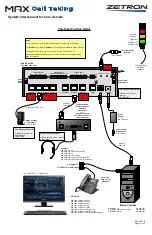
n
Caution
n
Warning
9
F
o
r Y
o
u
r Safet
y A
s
W
e
ll
A
s
That O
f O
thers
l
Do not operate outdoors on rainy days, run through puddles of water or use when visibility is limited.
Should any type of moisture (water or snow) enter any component of the system, erratic opreation and loss of control
may occur.
l
Do not operate in the following places.
-Near other sites where other radio control activity may occur.
-Near people or roads.
-On any pond when row boats are present.
-Near high tension power lines or communication broadcasting antennas.
Interference could cause loss of control. Improper installation of your Radio Control System in your model could result in
serious injury.
Operation Precautions
l
Do not operate this R/C system when you are tired, not feeling well or under the influence of
alcohol or drugs.
Your judgment is impaired and could result in a dangerous situation that may cause serious injury to yourself as well as
others.
j
Extend the transmitter antenna to its full length.
If the transmitter antenna is not fully extended, the operating range of the radio will be reduced.
j
Always perform a operating range check prior to use.
Problems with the radio control system as well as improper installation in a model could cause loss of control.
(Simple range test method)
Have a friend hold the model, or clamp it down or place it where the wheels or prop cannot come in contact with
any object. Walk away and check to see if the servos follow the movement of the controls on the transmitter. Should
you notice any abnormal operation, do not operate the model. Also check to be sure the model memory matches the
model in use.
j
Check the transmitter antenna to be sure it is not loose.
If the transmitter antenna works loose, or is disconnected while the model is running, signal transmission will be lost.
This will cause you to lose control of the model. Rotate the antenna softly with your fingers when checking whether it is
loosely or firmly fixed. Do not screw the antenna forcibly. Otherwise its antenna-holding part can be damaged.
j
Turning on the power switches.
Always check the throttle trigger on the transmitter to be sure it is at the neutral position.
1. Turn on the transmitter power switch.
2. Turn on the receiver or speed control power switch.
Turning off the power switches
Always be sure the engine is not running or the motor is stopped.
1. Turn off the receiver or speed control power switch.
2. Then turn off the transmitter power switch.
If the power switches are turned off in the opposite order, the model may unexpectedly run out of control and cause a
very dangerous situation.
l
Do not touch the engine, motor, speed control or any part of the model that will generate heat
while the model is operating or immediately after its use.
These parts may be very hot and can cause serious burns.









































